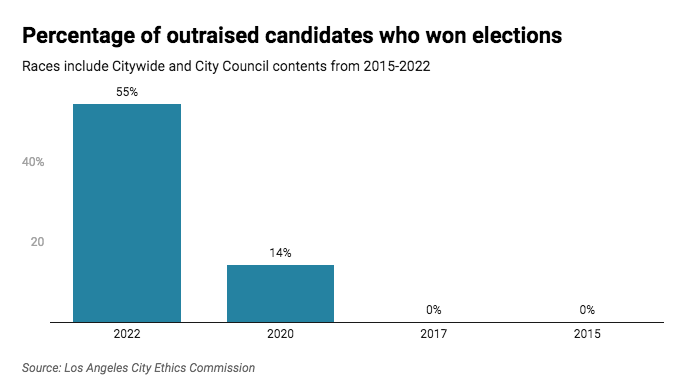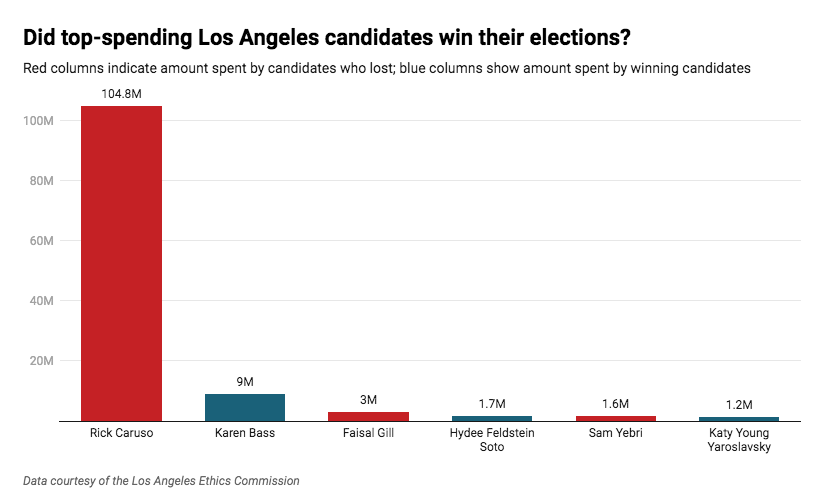In Los Angeles elections, money is no guarantee of victory

On Dec. 9, Karen Bass was sworn in as the 43rd mayor of Los Angeles. It has been well-chronicled how she withstood the more than $100 million that Rick Caruso spent on his campaign in the primary and general elections, largely through self-financing.
Although Caruso outspent Bass by a more than 11:1 margin, and dominated Los Angeles airwaves, she won by more than 9%. But in the 2022 city election cycle, Bass’ victory was not an anomaly. In fact, in all three citywide races — for mayor, city attorney and city controller — the candidate who raised the most money lost.
The trend continued in the eight city council contests, where, according to financial disclosures filed through Nov. 2 with the City Ethics Commission, three out-funded candidates toppled opponents with greater resources. This includes two incumbents who were beaten.
Of the 11 total city races, the candidate with more money won in only five.
This 55.5% of outraised candidates winning in Los Angeles is unprecedented. In the 2020 election cycle, when seven council seats were up for grabs, just one, or 14.3%, was claimed by an underfunded candidate.
In 2017, before the city switched election dates to align with state and federal balloting in the effort to boost turnout, all 11 contests were won by the better-funded candidate. It was the same in 2015.

Current results
In 2022, candidates across the city overcame sizable financial disadvantages. In the race for the District 1 seat, which includes Eastside communities such as Highland Park, Chinatown and Westlake, Eunisses Hernandez beat incumbent Gil Cedillo in the June primary by 8%, even though his $825,000 spent was twice as much as she shelled out (she exceeded 50%, so no runoff was required). In District 5, which covers Westwood, Beverly Grove, Fairfax and other neighborhoods in the central and western portions of the city, Katy Young Yarsolavsky was outspent in both the primary and runoff by Sam Yebri, but she finished first in each contest by approximately 20%. Altogether he spent $1.57 million to her $1.19 million.
[Live in Los Angeles? The Crosstown Neighborhood Newsletter has the stats about your community.]
In the citywide races, Faisal Gill spent $3 million combined in the primary and general elections hoping to be City Attorney. But he lost to Hydee Feldstein Soto, who dispatched $1.7 million. Kenneth Mejia became City Controller, winning over 63% of the vote in the general election, even though the total $1.1 million he spent in the two rounds was below the $1.47 million of his opponent, Paul Koretz.
Veteran Democratic strategist Michael Trujillo, who was involved with multiple campaigns in the recent election cycle, including an independent expenditure group supporting Bass, as well as incumbent Mitch O’Farrell’s losing effort in the District 13 runoff, said a major factor in the results was an anti-City Council bias. He noted that while Caruso wasn’t telling voters to support candidates such as Mejia or Hugo Soto-Martinez, who beat O’Farrell despite being outfunded, they benefited from the affluent developer’s anti-City Hall messaging.
“Caruso was basically deteriorating anyone with a city council member or city council person ballot designation, and so it made anyone look like they’re associated with the City Hall Bad News Bears,” Trujillo said.
He pointed out that a contributing factor to the anti-City Hall atmosphere was the October release of a secret recording in which Councilmembers Nury Martinez, Kevin de Leon and Cedillo, and labor leader Ron Herrera, took part in a conversation filled with racist and hate-filled language. Martinez and Herrera quickly resigned, Cedillo had lost in June to Hernandez, and de Leon has resisted calls to step down.

Change in atmosphere
While some of the election results stem from anti-City Hall sentiment, there is also a growing progressive movement in Los Angeles, said Bill Przylucki, executive director of the nonprofit political organizing group Ground Game LA. Two years ago Ground Game supported Nithya Raman, a progressive candidate who beat an incumbent, and in this cycle they endorsed progressive candidates such as Soto-Martinez, Hernandez, Mejia and District 11 candidate Erin Darling (who was defeated by the better-funded Traci Park).
Przylucki said progressive candidates with less money than an opponent can make up the difference with energy and volunteers who are willing to knock on doors, staff tables, create art or involve themselves with the community.
“If you were to actually try to figure out how to ascribe a dollar value for volunteer enthusiasm, I think what you’d find is our candidates tend to actually be much more competitive fundraisers,” Przylucki said. “They’re just not raising the type of thing you can report.”
These candidates, according to Przylucki, have been able to tap into what he believes the electorate really wants: a more progressive city.
“It’s really grounded in engaging people deeply and sort of helping to think through with them,” Przylucki said. “Where are they being directly impacted in their own life, in their communities, by public policy? And then sort of crafting an agenda based on the needs.”
While a record number of lesser-funded candidates won in the current cycle, money still matters, as it pays for everything from campaign staff to phone banking to mailers, and having cash can help a new candidate enhance their name ID.
Indeed, a financial advantage helped multiple candidates cross the finish line first. That includes Park, as well as Tim McOsker, who far outraised his District 15 opponent Danielle Sandoval, and in the runoff easily captured the seat that covers San Pedro, Watts and other communities.
Trujillo pointed out that with factors including the electoral schedule having changed, it will take the next few elections to determine if recent trends become permanent.
“We’ve only had two cycles of city voters voting against incumbents or pro incumbents,” Trujillo said, “so I think for us who live in the city of L.A. and are figuring out the 2024 cycle, it’s going to be interesting.”
How we did it: We examined publicly available campaign finance data from the Los Angeles City Ethics Commission in the period up to Nov. 2, 2022, as well as in past elections. More information about our data is here.
Have any questions? Write to us at askus@xtown.la.






